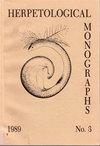历史视角:查尔斯·c·卡彭特和爬行动物行为生态学
IF 1.1
2区 生物学
Q3 ZOOLOGY
引用次数: 0
摘要
我很高兴受本次研讨会组织者的邀请,为查尔斯·康登·卡彭特致开幕词。我很荣幸被邀请谈谈我的朋友和同事的职业生涯和贡献。他的成就很容易被联系起来,因为记录是众所周知的,但他的个人特质呢?也许“烤肉”会起作用。或者我应该让事情变得更严肃,也许,更符合场合?在听取了他的一些家庭成员和以前的学生的意见后——这可能让查克松了一口气——我很快就决定,“烤肉”与我们在这里所尊敬的这位男士的个性和性格是不相容的。虽然查克当然不是没有幽默感——所有认识他的人都会记得他经常闪烁的眼睛,然后是滑稽的评论或双关语,通常只能被描述为查克的咯咯笑——但归根结底,他是一位绅士学者,有点老派,他有自己的想法。卡彭特于1921年6月2日出生在爱荷华州丹尼森。他于1943年获得北密歇根教育学院学士学位。毕业后,他参加了陆军专业训练计划(ASTP),并参加了几所大学的培训计划,包括在底特律韦恩大学医学院学习一年。第二次世界大战结束后,在他自己的要求下,他去了密歇根大学读研究生。1947年获理学硕士学位,1951年获博士学位。弗雷德里克·特斯特是他的主要教授。1947年,他娶了Mary Pitynski,她也是俄克拉何马医学研究基金会的一名杰出的生物化学家。他们的大女儿珍妮特(Janet)尽管患有严重的糖尿病,导致失明和肾脏移植,但她完成了人类学的两个学位,并继续独立生活,积极参与社区事务。他们的另一个女儿卡琳·苏(沃恩)在俄克拉何马州完成了博士学位,是俄克拉何马州生物调查局的水生生态学家。他们的儿子杰夫(Geoff)最近获得了新墨西哥州的博士学位,并在本次研讨会上发表了第一篇科学论文。1952年夏天,卡彭特首先在俄克拉何马大学生物站任教,1953年,他加入俄克拉何马学院担任助理教授,从而延续了他的前任A. I. Ortenberger, A. 0.建立的爬行动物学和脊椎动物动物学的传统。Weese和Arthur Bragg。1959年,他被提升为副教授,并成为斯托瓦尔博物馆(现为俄克拉何马州自然历史博物馆)爬行动物和两栖动物馆馆长。1966年,卡彭特成为正教授。1987年成为荣誉教授和荣誉策展人。他退休了,但肯定不是不活跃,他发表了几篇论文和他的部门的百年历史。卡本特的荣誉包括北密歇根大学杰出校友奖、俄克拉何马大学研究和创造性活动卓越成就奖、西南博物学家协会W. Frank Blair杰出博物学家奖(1986年)、俄克拉何马科学院杰出科学家奖(1991年)、爬虫学家联盟会员、本文章由计算机程序翻译,如有差异,请以英文原文为准。
Historical Perspective: Charles C. Carpenter and Reptilian Behavioral Ecology
I was pleased to be invited by the organizers of this symposium to give an opening encomium for Charles Congden Carpenter. I was honored to be asked to say something about the career and contributions of a personal friend and colleague. His accomplishments would be easy to relate, for the record is clear to all, but what about his personal traits? Perhaps a "roast" would work. Or should I keep things more serious and, perhaps, more in accord with the occasion? After obtaining the input of some of his family members and former students-and probably to Chuck's great relief-I soon decided that a "roast" was just not reconcilable with the personality and character of the man we honor here. Although Chuck is certainly not without humor-all who know him will recall his often twinkling eye, followed by a droll comment or pun and often what can be described only as Chuck's chuckle-he is in the final analysis a gentleman scholar, somewhat of the old school, who keeps his own counsel. Carpenter was born on 2 June 1921 in Denison, Iowa. He received his B.A. degree from Northern Michigan College of Education in 1943. After graduation, he entered the Army Specialized Training Program (ASTP) and attended training programs at several colleges, including a year at Wayne University Medical School in Detroit. After the end of World War II and at his own request, he left for graduate school at the University of Michigan. He received his M.S. in 1947 and Ph.D. in 1951. Frederick Test was his major professor. In 1947 he married Mary Pitynski, who also has had a professional career as an outstanding biochemist at the Oklahoma Medical Research Foundation. Their oldest daughter, Janet, despite severe diabetes that led to blindness and kidney transplants, completed two degrees in anthropology and continues to live independently and remain active in community affairs. Their other daughter, Caryn Sue (Vaughn), completed her Ph.D. at Oklahoma and is an aquatic ecologist with the Oklahoma Biological Survey. Their son, Geoff, recently received his Ph.D. from New Mexico State and presented the first scientific paper in this symposium. In the summer of 1952 Carpenter first taught at the University of Oklahoma Biological Station, and in 1953 he joined the Faculty at Oklahoma as an Assistant Professor, thus continuing the tradition there in herpetology and vertebrate zoology established by his predecessors A. I. Ortenberger, A. 0. Weese, and Arthur Bragg. In 1959 he was promoted to Associate Professor and also became Curator of Reptiles and Amphibians at the Stovall Museum (now the Oklahoma Museum of Natural History). Carpenter became a full Professor in 1966. In 1987 he became a Professor Emeritus and Curator Emeritus. Retired, but certainly not inactive, he has published several papers and a centennial history of his department. Carpenter's honors include Distinguished Alumni Award from Northern Michigan University, University of Oklahoma Regents' Award for Superior Accomplishment in Research & Creative Activity, first recipient (1986) of the W. Frank Blair Eminent Naturalist Award of the Southwestern Association of Naturalists, Outstanding Scientist Award from the Oklahoma Academy of Sciences (1991), Fellow of The Herpetologists' League,
求助全文
通过发布文献求助,成功后即可免费获取论文全文。
去求助
来源期刊

Herpetological Monographs
生物-动物学
CiteScore
5.40
自引率
0.00%
发文量
2
审稿时长
>12 weeks
期刊介绍:
Since 1982, Herpetological Monographs has been dedicated to original research about the biology, diversity, systematics and evolution of amphibians and reptiles. Herpetological Monographs is published annually as a supplement to Herpetologica and contains long research papers, manuscripts and special symposia that synthesize the latest scientific discoveries.
 求助内容:
求助内容: 应助结果提醒方式:
应助结果提醒方式:


